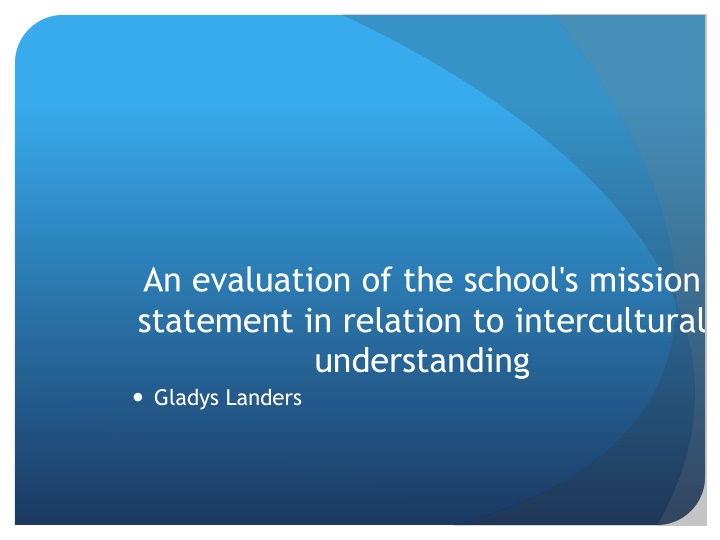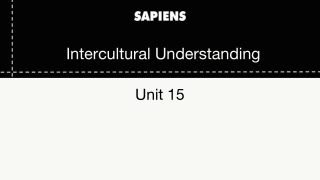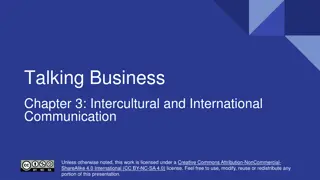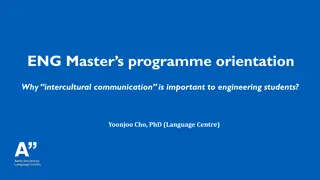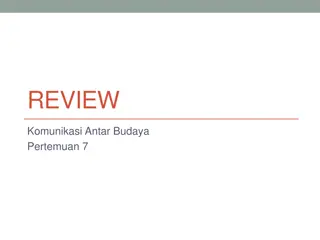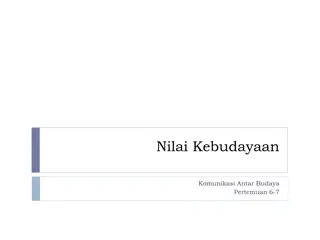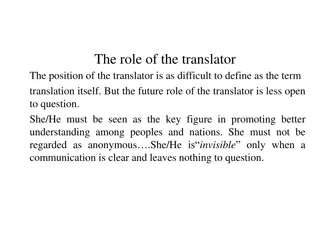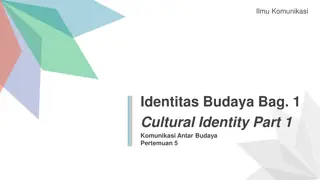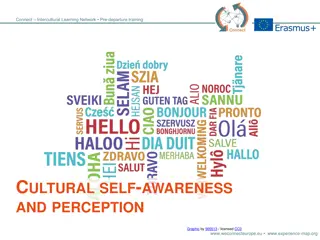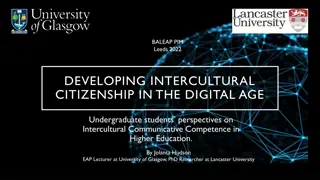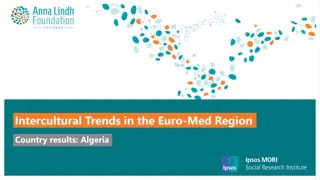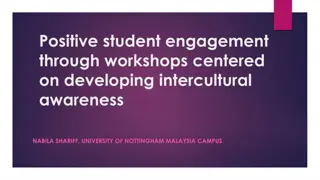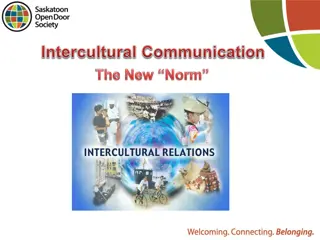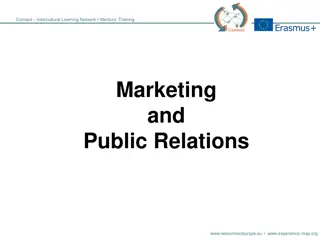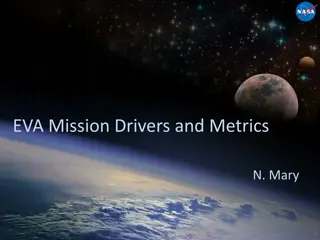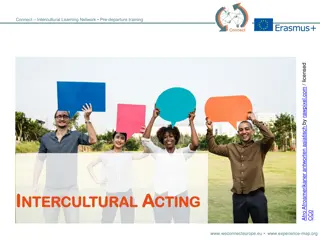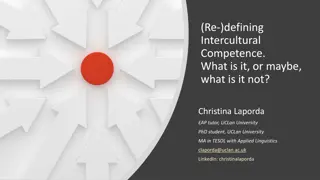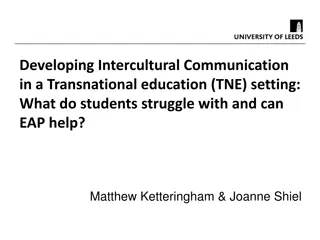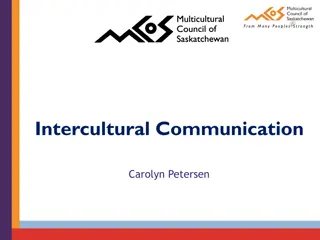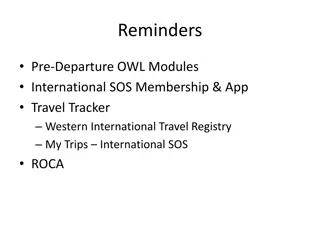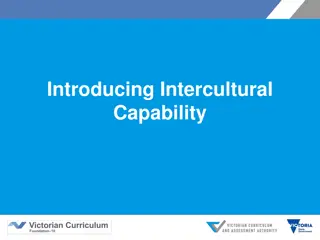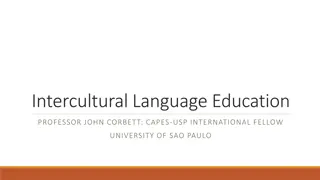Evaluating School Mission for Intercultural Understanding
An evaluation of the school's mission statement in relation to intercultural understanding, exploring strategies, challenges, and the importance of global awareness within the educational curriculum. Themes of relationships, emotions, local and global issues are discussed alongside breaking stereotypes and fostering international mindedness. The significance of character development, societal values, and the pastoral curriculum in promoting intercultural competence is highlighted.
Download Presentation

Please find below an Image/Link to download the presentation.
The content on the website is provided AS IS for your information and personal use only. It may not be sold, licensed, or shared on other websites without obtaining consent from the author.If you encounter any issues during the download, it is possible that the publisher has removed the file from their server.
You are allowed to download the files provided on this website for personal or commercial use, subject to the condition that they are used lawfully. All files are the property of their respective owners.
The content on the website is provided AS IS for your information and personal use only. It may not be sold, licensed, or shared on other websites without obtaining consent from the author.
E N D
Presentation Transcript
An evaluation of the school's mission statement in relation to intercultural understanding Gladys Landers
Context 1. Personal 2. Professional 3. Responsibilities
The IB DP Old Model New Model
Thesis Defining intercultural understanding (Mission Statement) Strategies used in the IBDP English classroom to engender intercultural understanding Challenges
Defining Intercultural Understanding Ian Hill discuss and probe global issues and cultural differences to arrive at international understanding, develop a sense of environmental responsibility, responsible local and global citizens. become informed and
The Ecole Mondiale World School Mission Statement One of our prime purposes is to develop international mindedness, along with valuing local traditions and culture. dedicated understanding for other cultures and acknowledging that others can be different and also right and to be a contributing member of community. learner for life, with respect and the local and global
Strategies 1. The Taught Curriculum Lawton (1983) defined Curriculum as a selection of the culture of a society.
Themes Relationships- across cultures, age groups and ethnicities. Growing up Strong emotions- love, hate, loyalty, vengeance Local issues- corruption, racial bias, nepotism, religious deception Global issues- captivity and freedom, gender roles
Characters Stereotypes Breaking stereotypes Archetypes
Strategy- Pastoral Curriculum Marland, (1980) pastoral curriculum is equally important since it concerns not only the cognitive but also the affective aspect of the emotions. learner, his feelings and Marland went on to suggest that a good pastoral curriculum would include personal guidance on social skills and relationships, educational skills with reference to study and information-finding skills and finally, vocational or career guidance.
Student development Useem, Donaghue and Useem (1963) had coined the term Third culture kid for children of expatriates working in India. McCaig nomads as a person of any age or nationality who has lived outside of his/her passport country because of a parent s career. (1992) defined global one of the common traits evident in most third culture kids is their rootlessness and restlessness. (Rader and Sittig, 2003)
Terry Haywood,(2007) The IBO has gone some way towards defining international mindedness through the ten attributes of the learner profile. Caring Balanced Risk taker Communicator Inquirer Thinker Reflective Principled Open Knowledgeable minded
Gellar (1993) explored the essence of an international school that made it different from any other school in these words, Not so much curriculum, but what takes place in the minds of children as they work and play together with children of other cultures and backgrounds. It is the child experiencing togetherness with different and unique individuals; not just toleration, but the enjoyment of differences; differences of colour, dress, belief, perspective.
Works Cited Blaney, J J (1991). The Internationa Schools and International Education, eds P L Jonietz and D Harris, Kogan Page, London Coffey M, Language, Literature and the Arts in T Pounds (eds) The International Baccalaureate Programme : An Introduction for Teachers and Managers, Routledge pp 95-97 Fail, H (2007). The Potential of the Past in Practice: Life Histories of Former International School Students in The Sage Handbook of Research in International Education (eds) Hayden M, Levy J and Thompson J, 2007 Gellar C (1993). How International are we? , International Schools Journal, 26, pp 5-7 Hill I (2002). The History of International Education: An International Baccalaureate Perspective , in McHayden, J J Thompson and G R Walker (eds) International Education in Pratice: Dimensions for National and International Schools, Kogan Page, London pp 18-29 Haywood, T (2007). A Simple Typology of International Mindedness and its Implications for Eucation. In : The Sage Handbook of Research in International Education (eds) Hayden M, Levy J and Thompson J, 2007
Works Cited Hobson, D (2001). Who was Richard Cobden? Deluded Activist or Economic Revolutionary? IBO, International Baccalaureate Organization (1999) Language A Guide, IBO, Geneva IBO, International Baccalaureate Organization (2006)IB Learner Profile. Geneva: IBO IBO, International Baccalaureate Organization (2001) Creativity, Action and Service Guide, IBO, Geneva Lawton, 1983. Curriculum Studies and Educational Planning. London: Hodder and Stoughton Marshall, H (2005). Developing the Global Gaze in Citizenship Eduaction. Exploring the perspectives of global education NGO workers in England. International Journal of Citizenship and Teacher Education 1:2 McCaig, N (1992). Birth of a Notion. In : The Global Nomad Quarterly, 1 (1), 1-2 McKenzie, M (1998) Going, Going, Gone Global! In M Hayden and J Thompson (eds) International Education: Principles and Practice. London: Kogan Page, pp 242-52
Works Cited Rader, D; Sittig, L.H (2003). New Kid in School: Using Literature to help children in transition. New York: College Press Snapper, G. Marked for Life? Progression from the IBDP. In The International Baccalaureate Diploma Programme: An Introduction for Tecahers and Managers. (eds) T Pound Terwilliger, R.I 1972. International Schools: Cultural Crossroads. In : The Educational Forum, 36 (3), 359-363 Thompson J J, Hayden M C and Cambridge J C (2003). Towards a Structural Typology for Baccalaureate Style Curricula in G Philips and T Pounds (eds) The Baccalaureate: A Model for Curriculum Reform, Kogan Page, London pp 29-46 Useem, J, Donaghue, J.D and Useem, R. H (1963). Men in the Middle of the Third Culture. Human Organization, 22 (3) : 169-79 [online] http://www.assetpub.com/archive/gc/97-03gcfall/fall97GC054.html
